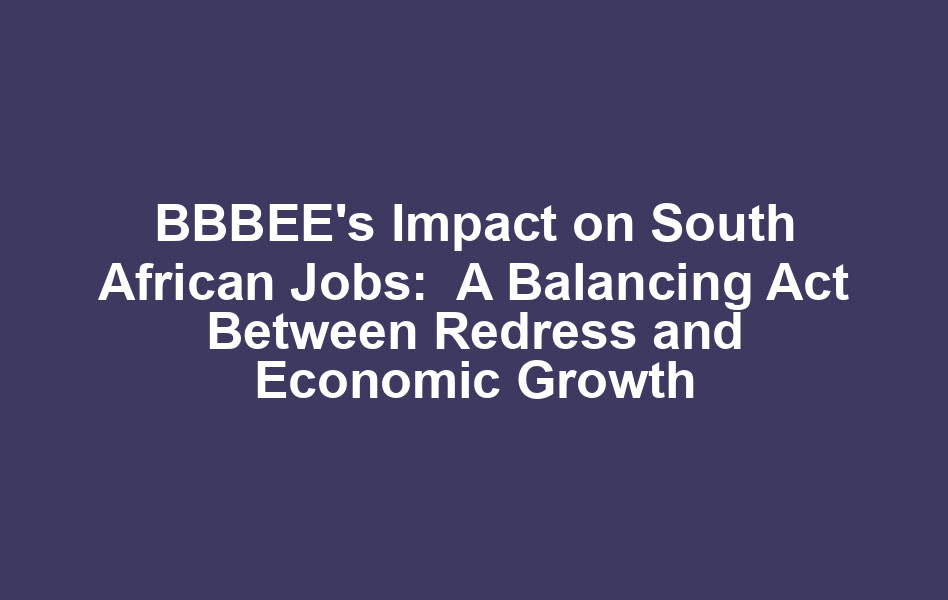The Double-Edged Sword: Examining the Impact of BBBEE on South African Employment
Broad-Based Black Economic Empowerment (BBBEE) is a cornerstone of South Africa’s post-apartheid economic transformation. Designed to redress historical injustices and create a more inclusive economy, it has profoundly impacted the South African employment landscape. While intended to uplift previously disadvantaged groups, its implementation has generated complex and often debated consequences for the local job market, employment laws, and career opportunities. This article delves into the multifaceted impact of BBBEE, examining its successes, challenges, and overall effect on South African employment.
Historical Context and the Genesis of BBBEE:
Apartheid left a legacy of deep-seated economic inequality in South Africa. The white minority controlled the vast majority of wealth and economic opportunities, while black South Africans were systematically excluded from skilled labor, management positions, and ownership of businesses. Recognizing the need for radical economic transformation, the post-apartheid government introduced BBBEE as a policy instrument to rectify these imbalances. The core objective was to empower black South Africans across various economic spheres, including ownership, management control, skills development, enterprise and supplier development, and socio-economic development.
BBBEE Legislation and its Influence on Employment Laws:
The BBBEE Act of 2003 laid the foundation for the policy framework, subsequently refined through Codes of Good Practice and sector-specific charters. These legal frameworks have significantly influenced South African employment laws, introducing requirements for companies to demonstrate compliance with BBBEE targets in areas such as employment equity, skills development, and preferential procurement. The Employment Equity Act of 1998, while a separate piece of legislation, complements BBBEE by promoting equal opportunities and eliminating unfair discrimination in employment. Together, these laws have spurred affirmative action initiatives, aiming to increase representation of previously disadvantaged groups at all levels of employment.
Impact on the Local Job Market:
Positive Impacts:
- Increased Representation: BBBEE has undoubtedly led to increased representation of black South Africans in various sectors, particularly in management and executive positions. This has opened up career paths previously inaccessible to many and has contributed to a more diverse workforce.
- Skills Development: The emphasis on skills development within the BBBEE framework has led to increased investment in training and development programs for black employees. This has enhanced the skills base within the economy and contributed to improved productivity.
- Entrepreneurship and SMME Development: BBBEE has facilitated the growth of black-owned businesses through preferential procurement policies and enterprise development programs. This has stimulated entrepreneurship and created new employment opportunities.
- Socio-economic Development: BBBEE initiatives aimed at socio-economic development have contributed to poverty alleviation and community upliftment through investment in education, healthcare, and other social programs.
Challenges and Criticisms:
- Fronting: One of the most significant challenges associated with BBBEE is the practice of “fronting,” where companies create a facade of black ownership or management without genuine transfer of power or economic benefits. This undermines the core objectives of BBBEE and perpetuates inequality.
- Skills Gaps and Brain Drain: While BBBEE promotes skills development, concerns remain about persistent skills gaps in certain sectors. Furthermore, some argue that affirmative action policies have contributed to a “brain drain” as skilled white professionals seek opportunities elsewhere.
- Cost of Compliance: The administrative burden and cost of complying with BBBEE regulations can be substantial, particularly for small and medium-sized enterprises (SMEs). This can hinder their growth and competitiveness.
- Reverse Discrimination: Some critics argue that BBBEE policies have led to reverse discrimination against white South Africans, hindering their career progression and creating resentment.
- Focus on Ownership over Skills: Critics also point to an overemphasis on ownership targets within BBBEE, potentially at the expense of genuine skills development and economic empowerment.
Career Opportunities in the Context of BBBEE:
BBBEE has created specific career opportunities related to compliance, verification, and transformation consulting. Demand for BBBEE specialists and consultants has grown significantly as companies seek to navigate the complexities of the legislation and optimize their BBBEE scorecards. Furthermore, the focus on skills development has created opportunities for training providers and educators.
Beyond these specific roles, BBBEE has indirectly impacted career opportunities across various sectors. The emphasis on representation has opened doors for black professionals in fields such as finance, law, engineering, and information technology. However, the skills gap remains a challenge, highlighting the importance of continuous learning and development for individuals seeking to advance their careers.
The Future of BBBEE and its Impact on Employment:
The future of BBBEE is subject to ongoing debate and policy review. There is a growing recognition of the need to refine the policy framework to address its shortcomings and ensure that it effectively achieves its transformative objectives. This includes strengthening measures to combat fronting, promoting genuine skills development, and streamlining compliance processes.
The Fourth Industrial Revolution (4IR) presents both opportunities and challenges for BBBEE. While technological advancements can create new employment opportunities, they also risk exacerbating existing inequalities if access to technology and digital skills is not equitably distributed. Therefore, future BBBEE policies must consider the implications of 4IR and ensure that black South Africans are equipped to participate in the digital economy.
Conclusion:
BBBEE has undeniably played a significant role in reshaping the South African employment landscape. While it has achieved notable successes in increasing representation and promoting skills development, challenges such as fronting, skills gaps, and the cost of compliance persist. The future success of BBBEE hinges on addressing these challenges and adapting the policy framework to the evolving economic landscape. Moving forward, a balanced approach that prioritizes both transformation and economic growth is crucial to ensure that BBBEE contributes to a more inclusive and prosperous South Africa for all. This requires a concerted effort from government, business, and civil society to work together towards achieving the shared goal of genuine economic empowerment and sustainable job creation.
